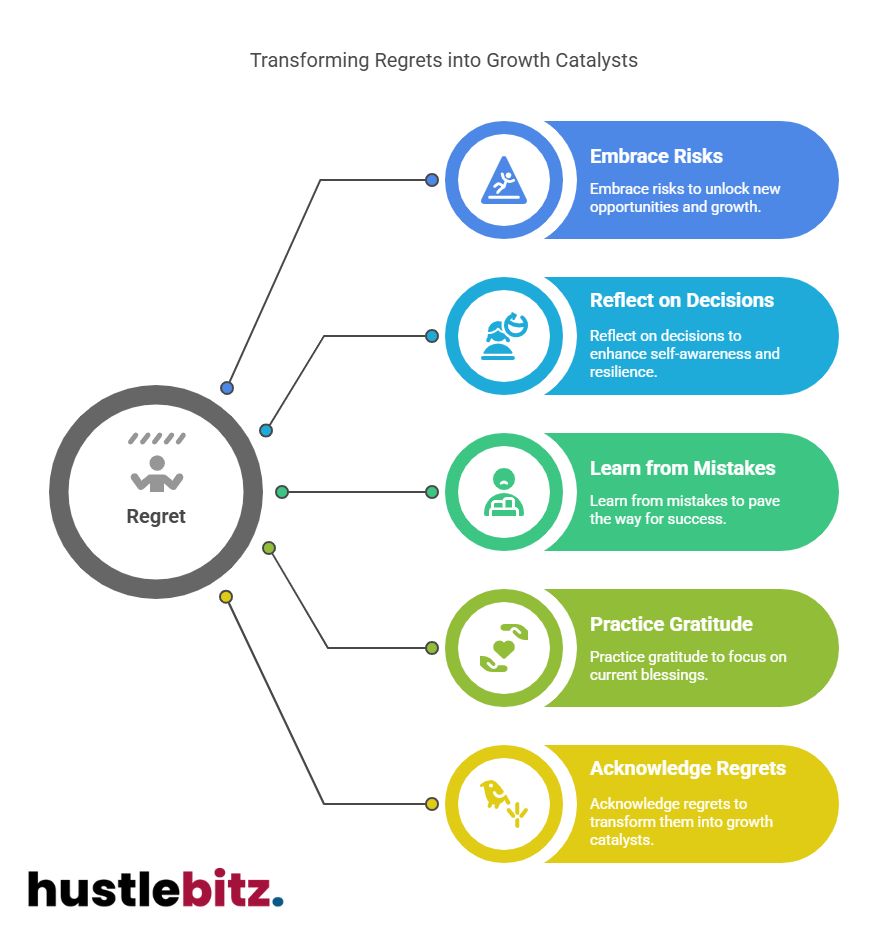Navigating regret involves embracing reflection and learning from past experiences. Many influential quotes underscore this journey. For instance, Chloe Kim advises to fully embrace life’s opportunities to avoid regret. Paul Martens highlights the value of past choices in fostering wisdom, while Colleen Hoover notes that regret hinders progress. Jodi Picoult likens regret to driving in reverse, emphasizing the importance of forward movement. These insights encourage a proactive approach, reminding us that every choice shapes our future. By appreciating these perspectives, one can transform regret into a catalyst for growth and resilience, allowing for a more fulfilled existence. More insights await.
Key Takeaways
- Regret often stems from inaction; embrace risks for personal growth and new opportunities.
- Reflecting on past decisions fosters self-awareness and aids in emotional resilience.
- Mistakes are valuable learning experiences; view them as stepping stones for future success.
- Mindful living and gratitude practices can shift focus from regrets to current blessings.
- Acknowledging regrets as part of your journey transforms them into catalysts for growth.

“The one thing I learned is to just give everything a shot. You don’t want to live in regret.” – Chloe Kim
Chloe Kim’s insight emphasizes the importance of seizing opportunities and the potential consequences of allowing fear to dictate our choices, ultimately warning against the burden of regret.
In a world filled with uncertainties, adopting a risk-taking mindset is crucial for personal and professional growth. By embracing failure, we allow ourselves to learn from our missteps, transforming obstacles into stepping stones toward success.
Fear of judgment often stifles our willingness to take risks, leading us to hesitate when faced with new possibilities. However, overcoming this hesitation can unlock a wealth of opportunities. The journey towards self-discovery and achievement is often paved with challenges, but those who confront these adversities typically experience significant growth. Embracing failure is not an indication of weakness; rather, it demonstrates resilience and a commitment to improvement.
When we choose to give everything a shot, we not only expand our horizons but also redefine our relationship with fear. By reframing our perspective on risk and reward, we can cultivate a mindset that values action over inaction. This shift allows us to navigate life’s complexities with confidence, lessening the grip of regret.
Ultimately, Kim’s message encourages us to take brave steps forward, reminding us that the most profound lessons often arise from our willingness to embrace the unknown. Thus, let us move forward with courage, ready to explore new ventures without the shadow of potential regret looming over us.
“Stop fretting about past decisions. They have provided valuable wisdom. Go forward without fear or regret.” – Paul Martens
Acknowledging the lessons learned from past decisions is vital for personal growth, as Paul Martens succinctly reminds us to stop fretting and instead embrace the wisdom gained from those experiences. Each decision, whether perceived as favorable or regrettable, contributes to our understanding of ourselves and the world around us. By recognizing this, we foster a mindset that values growth over stagnation.
Engaging in self-forgiveness practices is essential in this journey. It allows us to release the burdens of past choices, enabling a clearer path toward our future aspirations. When we forgive ourselves, we cultivate resilience and the courage to embrace uncertainty, which is an inherent part of life’s journey.
This shift in perspective is crucial; it empowers us to view challenges not as setbacks but as opportunities for learning and development. The wisdom acquired from past experiences serves as a foundation for future endeavors.
By focusing on the lessons learned rather than the regrets left behind, we position ourselves to take informed risks and make choices aligned with our true values and goals. Embracing this proactive approach to personal growth ensures that we can move forward without fear or regret, fully engaged in the pursuit of our aspirations.
Ultimately, by shifting our focus from what has been lost to what can still be achieved, we open ourselves to a life rich with potential and possibility.
“Regret is counterproductive. It’s looking back on a past that you can’t change. Questioning things as they occur can prevent regret in the future.” – Colleen Hoover

Regret serves as a mental anchor, tethering us to a past that is unchangeable and hindering our ability to engage fully with the present. The weight of regret can cloud our judgment, making it difficult to embrace life changes and pursue new opportunities. To combat this, one can employ self-reflection techniques that encourage a forward-looking mindset. By analyzing our experiences without dwelling on past mistakes, we can extract valuable lessons that contribute to personal growth journeys.
Overcoming negative thoughts associated with regret requires the implementation of effective decision-making strategies. These strategies involve questioning our choices as they occur, allowing us to weigh potential outcomes and consider alternatives before acting. This proactive approach not only reduces the likelihood of future regret but also fosters a sense of empowerment and control over our lives.
Incorporating mindfulness practices can further enhance our ability to stay present, enabling us to appreciate the moment rather than obsessing over what has already transpired. By focusing on the here and now, we cultivate resilience and adaptability, crucial traits for navigating the complexities of life.
Ultimately, embracing life changes becomes easier when we free ourselves from the shackles of regret. By recognizing that the past cannot be altered, we create space for new experiences and growth. This shift in perspective not only enriches our lives but also serves as a reminder that our future is shaped by the decisions we make today.
“Living with regrets was like driving a car that only moved in reverse.” – Jodi Picoult

Living with regrets can create a disorienting experience, much like attempting to navigate life while confined to a vehicle that only allows backward movement. This metaphor, articulated by Jodi Picoult, illustrates how dwelling on past decisions can hinder our ability to move forward effectively. Instead of focusing on personal growth and the lessons life has to offer, individuals may become trapped in a cycle of regret management that impedes emotional healing.
To address this, it is crucial to implement decision-making strategies that prioritize present action over past mistakes. By reframing regrets as opportunities for learning, we can foster a mindset that embraces life lessons rather than one that clings to unchangeable circumstances. The following table illustrates key aspects of managing regrets effectively:
| Aspect | Description |
| Regret Management | Techniques to cope with and understand regrets. |
| Emotional Healing | Processes that facilitate recovery from past decisions. |
| Decision Making Strategies | Tools that support informed choices moving forward. |
| Personal Growth | The evolution of self through experiences and lessons. |
| Life Lessons | Insights gained from reflecting on past actions. |
“Regret is mostly caused by not having done anything.” – Charles Bukowski

Charles Bukowski’s assertion highlights that the greatest source of regret often stems from inaction rather than mistakes made, emphasizing the importance of seizing opportunities.
Individuals frequently find themselves burdened by unfulfilled dreams and the weight of missed opportunities that arise from a reluctance to act. This inaction is often rooted in a profound fear of failure, which paralyzes decision-making and prevents personal growth.
When contemplating life choices, many people reflect on paths not taken, leading to a pervasive sense of regret. Each moment of hesitation can morph into a lost chance, making one acutely aware of what could have been achieved. The realization that a lack of action can thwart aspirations is a powerful motivator for change, prompting individuals to confront their fears head-on.
Moreover, embracing the notion that mistakes are a natural part of the journey can alleviate the burden of regret. By understanding that every choice carries the potential for growth, individuals can shift their perspective, viewing inaction as the real failure.
Taking calculated risks can pave the way for new experiences and insights, ultimately leading to a more fulfilling life.
“The longer our trail of regrets, the more we tend to value the importance of making wise decisions.” – Bob Santos

Acknowledging the weight of past decisions can significantly enhance one’s appreciation for the necessity of making thoughtful choices in the future. As individuals traverse their unique journeys, the accumulation of regrets often serves as a poignant reminder of the importance of sound decision-making strategies. Each regret, whether large or small, can illuminate the path toward personal growth and maturity.
In the face of adversity, the lessons learned from earlier choices can bolster emotional resilience. By reflecting on past missteps, individuals can identify patterns that led to regret, enabling them to develop more effective decision-making strategies moving forward. This process not only supports overcoming obstacles but also fosters a deeper understanding of oneself and one’s values.
Future planning, informed by the lessons of the past, becomes a vital tool in shaping a more fulfilling life. When we recognize the repercussions of earlier decisions, we are compelled to approach future choices with greater care and insight. This mindful approach not only mitigates potential regrets but also empowers us to navigate life’s complexities with confidence.
In essence, the longer our trail of regrets, the more we cultivate an awareness of the significance of our decisions. By embracing this understanding, we can transform past experiences into stepping stones for future success, ultimately guiding us toward a more intentional and rewarding life.
“Never regret anything from your past because one day, you’ll look back and thank it for hurting you so much that you decided to become a stronger human being.” – Faith Star

Embracing the idea that our past experiences, regardless of their pain, can ultimately serve as catalysts for personal growth is essential to fostering resilience and strength. The notion that we should never regret anything from our past invites us to reframe our understanding of pain and adversity. Each challenge, each heartache, can be viewed as a transformative experience that contributes to our journey toward emotional resilience.
When we encounter difficulties, it is natural to feel overwhelmed and discouraged. However, these moments often impart invaluable learning lessons that shape our character. The strength we gain through adversity not only empowers us to navigate future obstacles but also enhances our ability to empathize with others who are struggling. Reflecting on past hardships with gratitude allows us to recognize the profound impact these experiences have had on our development.
As we look back on our lives, the pain we once endured can become a source of appreciation for the strength we have cultivated. Instead of viewing our past through a lens of regret, we can honor our journey by acknowledging how each experience, no matter how challenging, has contributed to our growth.
In this way, we cultivate a mindset that values resilience and embraces the lessons learned. Ultimately, by thanking our past for its role in shaping who we are today, we can move forward with confidence, ready to tackle whatever life may present.
“If we fill our hours with regrets over the failures of yesterday, we have no today in which to be thankful.” – Anonymous

Regret can consume our thoughts, leaving little room for appreciation of the present moment. When we dwell on past failures, we risk losing sight of the joys and opportunities that exist right now.
In the practice of mindful living, it becomes essential to acknowledge our regrets without allowing them to overshadow our current experiences. By recognizing that our past does not define us, we can cultivate a mindset focused on emotional healing and growth.
Engaging in a gratitude practice can be a transformative tool in this journey. By consciously reflecting on what we are thankful for today, we shift our focus away from regrets and towards the blessings that surround us. This simple yet profound adjustment allows us to reclaim our time and energy, fostering a more positive outlook on life.
Moreover, embracing the present moment paves the way for effective future planning. When we release the burdens of yesterday, we create space for new ideas and possibilities. This forward-thinking approach encourages us to learn from our experiences, using them as stepping stones toward a more fulfilling life.
“If you live long enough, you’ll make mistakes. But if you learn from them, you’ll be a better person. It’s how you handle adversity, not how it affects you. The main thing is never quit, never quit, never quit.” – William J. Clinton

Learning from mistakes is a vital aspect of personal growth, and as William J. Clinton emphasizes, it is our response to adversity that ultimately shapes our character.
Mistakes made are not merely failures; they serve as invaluable learning opportunities that propel us toward self-improvement. Embracing challenges allows us to navigate life’s complexities with resilience, fostering a mindset that sees setbacks as stepping stones rather than stumbling blocks.
Here are three key principles to consider when handling adversity:
- Reflection: Take time to analyze the mistakes made. Understanding what went wrong can reveal insights that prevent similar errors in the future.
- Adaptation: Use the lessons learned to modify your approach. This adaptability is crucial for personal growth, allowing you to face new challenges with a more informed perspective.
- Persistence: Never quit. The path to improvement is often fraught with difficulties. Consistent effort in the face of adversity is what ultimately leads to success.
“Regrets are idle; yet history is one long regret. Everything might have turned out so differently.” – Charles Dudley Warner

How often do we reflect on the choices we’ve made and ponder the alternate paths our lives might have taken, as Charles Dudley Warner suggests in his observation about the pervasive nature of regret throughout history?
Regret, while often perceived as a negative emotion, can serve as a catalyst for personal growth. It forces us to confront our decision-making processes, compelling us to analyze past choices and consider their implications on our lives.
Warner’s insight into history being a tapestry of regrets underscores the importance of recognizing that every choice carries weight. Each decision has the potential to shape our future aspirations, and while we may dwell on what could have been, it is crucial to channel that energy into emotional resilience.
By learning from our regrets, we transform them into valuable life lessons, equipping ourselves to make more informed choices moving forward.
The journey of self-reflection is not merely about lamenting missed opportunities but rather about embracing the lessons learned along the way. As we navigate through life’s complexities, understanding our regrets can illuminate the path ahead, guiding us toward a more purposeful existence.
In this light, regret becomes not an idle sentiment but a powerful tool for personal development, fostering a future where we make decisions aligned with our true values and aspirations.
Thus, rather than being shackled by past choices, we can empower ourselves to forge a brighter, more intentional future.
Final Thoughts
Regret and reflection are powerful tools for personal growth, helping us to better understand our past choices and shape a more intentional future. The quotes and insights shared throughout this article serve as reminders that regret is not meant to hold us back but to guide us forward. By embracing past mistakes and using them as lessons, we cultivate resilience and wisdom, allowing us to approach life with a deeper sense of purpose. Remember, regret is not a life sentence; it’s a stepping stone toward becoming the best version of yourself. Use these reflections to make more mindful, meaningful decisions as you continue your journey forward.




